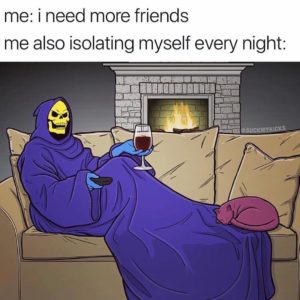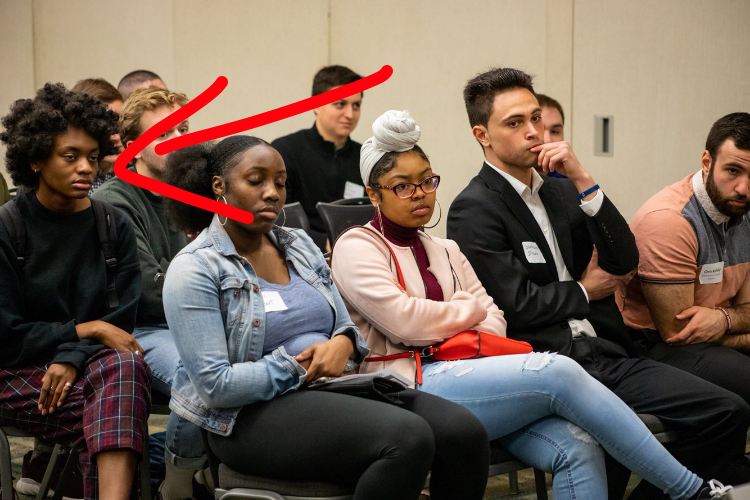Usually, once we go to college we think we never have to spend another moment alone. Sororities, fraternities, clubs, jobs, dorm hall meetings, roommates, dining halls; all these spaces and organizations give us little reason to ever spend a moment without someone by our side. My grappling with ‘aloneness’ didn’t sprout from hating or not understanding this consequence of setting. I knew it intimately. I’d prepared myself to morph into a social butterfly since the beginning of my senior year of high school. I just never prepared myself for the more nuanced reality of it.

As a kid, the first thing my peers, teachers, friends and parents always said about me was how quiet I was. I kept to myself then and I keep to myself now. Alone time was spent reading or engaging in my favorite pastime: napping. Alone time was most comfortable for me because it was naturally how I ended up spending my time: being quiet.
Later in life this well-known habit flipped upside down. I had no alone time. In the mad dash to look like a fantastic student for college admissions offices, I joined several school groups, volunteered for dozens of hours of my senior year, became leader of organizations and rekindled my tendency to be an overachiever. I spent almost every second of my junior and senior years talking, negotiating, scheduling, planning, begging for letters of recommendations, coming home hours after school had ended because I needed to dedicate any second of my day to using my words to prove my academic worth.
When I got to college, I didn’t drop my trend of constantly being around people. In fact, I tried to ride the momentum of community activism. I began volunteering, working and burning my candle at both ends. And I knew I’d have to work twice as hard as everyone else to make friends. I didn’t have an RA to schedule mandatory meetings where I’d have no choice but to meet my floor mates. My apartment consisted of a private room with roommates I didn’t like. I’d moved to Philadelphia from a suburban town in Maryland. Sorority life was never my thing. I had devastating resting ‘serious face’. I was an overachiever out of fear for failure, so I didn’t have the same go-get-em, grab-life-by-the-horns attitude as my peers.

So, I went to every interest meeting for any group that held my attention for even a second. Almost immediately after orientation, I decided the number one way seem interesting and set myself apart as a student at a huge bustling college in a metropolitan city, in a state I wasn’t native to, was to dedicate myself to 20 different activities and see what stuck. But at some point, I lost the momentum. After participating in all these groups, I still found that plenty of my alone time was involuntary. I tended to get food alone, study in the library alone and ask to do projects alone. I found myself constantly around other people, which seemed like exactly what I wanted four semesters ago, but found myself alone whether I wanted to be or not, in public and private. It seems a little ironic. I thought I was doing so well beating back loneliness with a stick, but now I see the attraction to solitude. As responsibilities and obligations formed a huge pile looming above my head, I spent the little time I could get indulging in the voluntary alone time. I felt like a stretched rubber band about to snap, and being around people wound me up even further, and my alone time was my time to unwind myself.
Call me lazy, but sitting in bed alone in my apartment, sweatpants on, in the dark scrolling through social media with my brain turned off makes me more comfortable and happy than I would feel throughout an entire day of class, work and meetings. After hours upon hours of having mandatory conversations, all I want is to be a little selective about what I can listen to or say. And sometimes what I want to say or hear is absolutely nothing. Sometimes a little nothingness makes me feel like even if the imaginary duct tape barely holds me together, I can appreciate spending time with myself, instead of seeing it as being unwillingly relegated to loneliness.
I could sing my praises for alone time for a year straight. I felt a deep difference in choosing to spend my time with myself indulging in peace and quiet, and wanting to be around people so I could try to be that social butterfly but it never working out that way. Sure, I feel closer to the right dichotomy of alone and loneliness than I did in previous years, but the less attractive opinion might result in a better outcome for me. I drag myself out of bed to meetings, dinner hours, group project meet-ups and shifts at work no matter how much I dislike them at first because at the end of the day balancing alone time, placing myself around likeminded driven individuals and having something to do really does the brain some good.



















